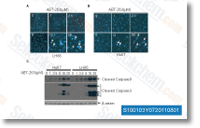mouse macrophage iNOS. rat, bovine, drosophila, porcine brain NOS. human, porcine, bovine eNOS. Substrates Poly L Lysine coated glass cover slips and microcrystalline TiO2 movies have been made use of as reference samples for cell culture. Flat TiO2 films were grown on glass slides by electron beam evaporation of a titanium target. The evaporated metal was partially oxi dized during the deposition and virtually fully oxidized in subsequent air publicity. To complete the oxidation and clear away contaminants, these substrates were subjected to your exact same annealing method applied to nanostructured films, as described under. Cluster assembled ns TiO2 substrates were grown on clean glass slides by SCBD applying a Pulsed Microplasma Cluster Supply, as described in detail in, Briefly, the PMCS operation principle is primarily based around the ablation of the titanium rod by an argon plasma, ignited by a pulsed electric discharge, The ablated species thermalize with the argon and condense to type clus ters.
The mixture of clusters and inert fuel is then extracted in vacuum by means of an aerodynamical focusing assembly to type a seeded supersonic beam, the clusters are then collected on a substrate found inside the beam trajectory. selleck Because the clusters kinetic energy is reduced ample to avoid fragmentation, the nanoparticles impin ging on the substrates maintain their authentic construction and, by way of random stacking, a nanostructured film is grown, The deposition course of action requires area below substantial vacuum so making it possible for the partial oxidation of the Ti clusters, further oxidation is obtained upon air expos ure to atmospheric disorders and its completed having a mild annealing for two h at the temperature of 250 C beneath a continuous flux of dry air. The annealing pro cedure has the even more purpose of removing adsorbed species over the sample surfaces.
Film roughness was measured by Speak to Stylus Profilometry, the surface morphology was characterized by atomic force microscopy, The AFM is outfitted with rigid cantilevers with single crystal silicon recommendations and oper ated in Tapping Mode. Commonly, numerous 2 um 1 um photographs were acquired on every sample, and flattened by line by line subtraction of 1st BGJ398 and 2nd  buy polynomials in an effort to remove the tilt from the sample and of the scanner bow. From flattened AFM photographs, the typical nanoscale root suggest square roughness and exact location parameters had been calculated. The electronic framework of as deposited and annealed ns TiO2 was characterized in a UHV ap paratus Leybold LHS 10 twelve equipped having a hemispherical electron analyzer and traditional X ray source, The high resolution spectra had been acquired in continuous pass power mode Epass 30 eV with an general vitality resolution of 1.
buy polynomials in an effort to remove the tilt from the sample and of the scanner bow. From flattened AFM photographs, the typical nanoscale root suggest square roughness and exact location parameters had been calculated. The electronic framework of as deposited and annealed ns TiO2 was characterized in a UHV ap paratus Leybold LHS 10 twelve equipped having a hemispherical electron analyzer and traditional X ray source, The high resolution spectra had been acquired in continuous pass power mode Epass 30 eV with an general vitality resolution of 1.
Mirna Synthesis
Many miRNAs are evolutionarily conserved, which implies that they have important biological functions.
